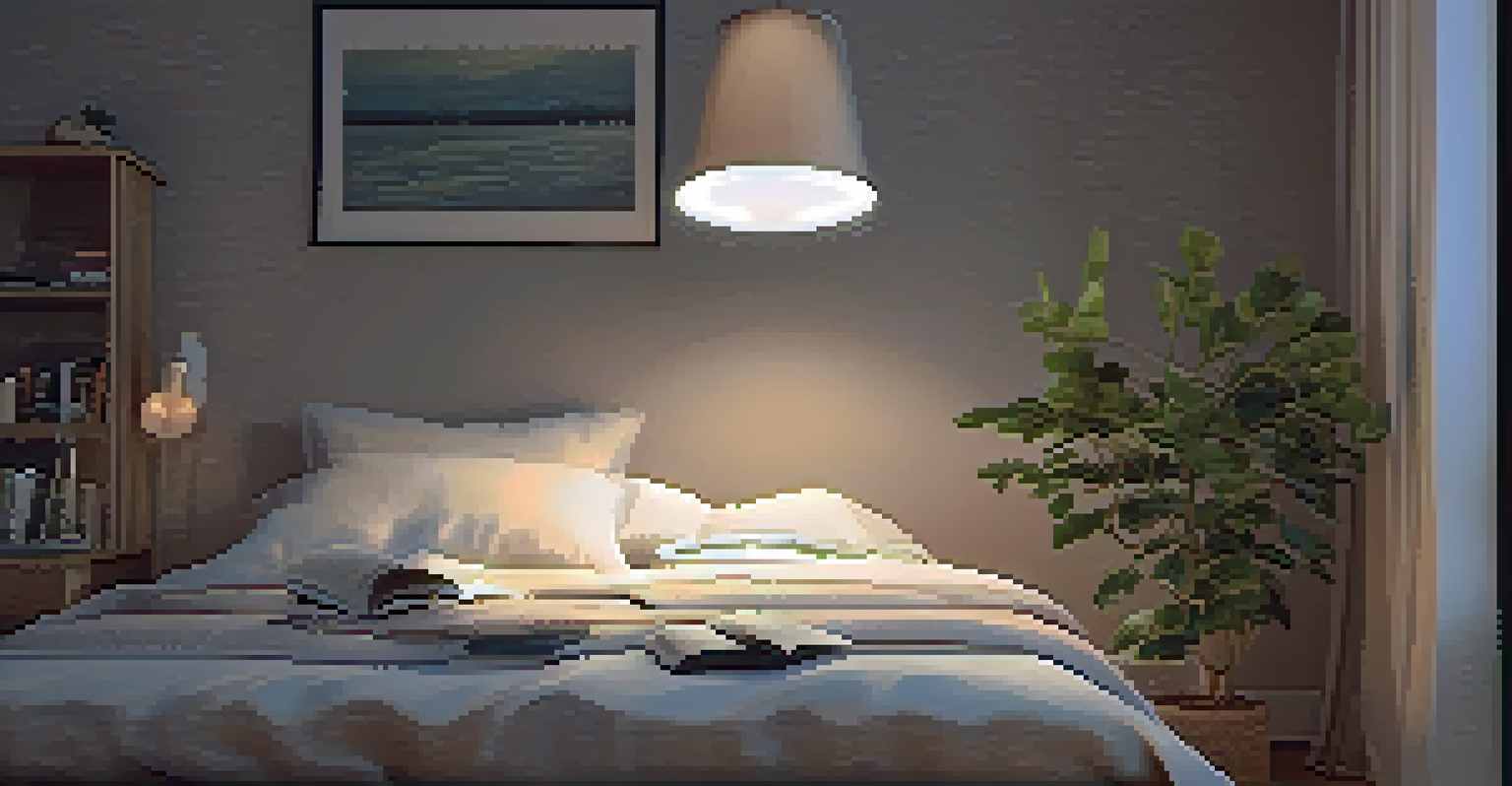Sleep Hygiene Practices for Those in Recovery from Addiction

Understanding Sleep Hygiene in Recovery
Sleep hygiene refers to a set of practices that promote consistent, quality sleep. For individuals in recovery from addiction, establishing good sleep hygiene is crucial, as it aids in the healing process. Sleep disruptions are common during recovery, making these practices even more valuable. By prioritizing sleep hygiene, you can create a supportive environment for both your mind and body.
Sleep is the best meditation.
In recovery, your body undergoes significant changes and needs adequate rest to heal. Good sleep hygiene helps regulate your sleep patterns, allowing your body to recover more effectively from the stress of addiction. Think of it as laying the foundation for a house; without a solid base, everything else struggles to stand tall. Establishing strong sleep habits can lead to improved emotional and physical health.
By understanding sleep hygiene and its importance, you can take meaningful steps towards better sleep. This sets the stage for more successful recovery, as proper rest enhances your ability to cope with cravings and stress. Remember, recovery is a journey, and good sleep hygiene is one of the essential tools you can use along the way.
Creating a Sleep-Friendly Environment
Your sleep environment plays a significant role in your ability to rest well. A dark, quiet, and cool space can help signal to your body that it’s time to wind down. Consider investing in blackout curtains, earplugs, or a white noise machine to enhance your sleeping conditions. Just as a cozy blanket wraps you in warmth, a supportive environment wraps you in comfort.

Keep your bedroom clutter-free and reserved for sleep and relaxation. This will help your mind associate the space with rest rather than stress or activity. Imagine your bedroom as a sanctuary, a safe haven where you can recharge and find peace. By fostering a calming environment, you make it easier to slip into restful sleep.
Importance of Sleep Hygiene
Establishing good sleep hygiene is crucial for individuals in recovery, as it supports healing and enhances overall well-being.
Additionally, consider using calming scents such as lavender or chamomile, which can promote relaxation. Engaging your senses in a positive way prepares your mind for sleep, much like how a warm cup of tea can soothe your thoughts at the end of the day. A well-curated sleep environment is a crucial step in your recovery journey.
Establishing a Consistent Sleep Schedule
Consistency is key when it comes to sleep. Going to bed and waking up at the same time each day helps regulate your body’s internal clock. Think of it as training your body like you would train for a marathon; the more consistent you are, the better your performance. This regularity can lead to deeper and more restorative sleep.
The best bridge between despair and hope is a good night's sleep.
During recovery, establishing a sleep routine can provide a sense of stability and structure. By creating predictable sleep patterns, you not only enhance your sleep quality but also support your overall mental well-being. It’s a small yet powerful commitment to make, akin to setting aside time for daily exercise.
Additionally, try to limit naps during the day, as they can interfere with nighttime sleep. If you feel the need to nap, keep it short and ensure it’s earlier in the day. By prioritizing a consistent sleep schedule, you lay the groundwork for healthier sleep habits that can significantly aid in your recovery.
Limiting Stimulants Before Bedtime
Caffeine and nicotine are two common stimulants that can disrupt your sleep. It’s wise to limit their intake, especially in the hours leading up to bedtime. Just as you wouldn’t want to fuel a car with the wrong type of gas, you wouldn’t want to fuel your body with stimulants when it’s time to rest. Reducing these substances can create a smoother transition into sleep.
Alcohol might seem like a way to unwind, but it can actually hinder your sleep quality in the long run. Although it may initially make you feel drowsy, it disrupts your sleep cycles later in the night. Instead of helping you relax, it can lead to restless nights, much like a roller coaster that keeps you on edge rather than providing a smooth ride.
Creating a Restful Environment
A sleep-friendly environment that is dark, quiet, and clutter-free can significantly improve your ability to rest and recharge.
By being mindful of what you consume before bed, you can improve your chances of falling asleep and staying asleep. This simple practice can have profound effects on your recovery, allowing your body to rest and rejuvenate more effectively. Make it a habit to check your evening routine and adjust as needed for better sleep.
Incorporating Relaxation Techniques
Relaxation techniques can significantly improve your ability to fall asleep and stay asleep. Activities like deep breathing, meditation, or gentle yoga can help quiet your mind and ease tension. Picture your mind as a busy highway; relaxation techniques act as traffic lights, allowing you to slow down and prepare for rest. Implementing these practices can create a smoother transition into sleep.
Setting aside time each evening to engage in relaxation techniques can signal to your body that it’s time to unwind. Even just 10-15 minutes can make a difference, helping to clear your thoughts and foster a sense of calm. It's like taking a warm bath at the end of a long day; it provides a moment of peace amidst the chaos.
Remember, relaxation is a personal journey, so find what works best for you. Whether it’s listening to calming music, practicing mindfulness, or journaling, the key is to make it a regular part of your nighttime routine. These techniques are not just beneficial for sleep; they also support your overall recovery journey.
Limiting Screen Time Before Sleep
In our digital age, screens can be a significant barrier to good sleep. The blue light emitted by phones, tablets, and computers can disrupt your body’s natural sleep-wake cycle. It’s like trying to fall asleep in a room filled with bright lights; your body simply won’t cooperate. Limiting screen time in the hour leading up to bed can help signal to your brain that it’s time to wind down.
Replacing screen time with relaxing activities, such as reading a book or taking a warm bath, can enhance your pre-sleep routine. Think of it as swapping out a loud party for a quiet evening; the latter creates a more conducive environment for relaxation. This shift can help prepare your mind for restful sleep, making it easier to drift off.
Seeking Help for Sleep Issues
If sleep challenges persist despite good practices, consulting a healthcare professional can provide tailored solutions to support recovery.
Consider setting a specific time each evening to unplug from your devices. This small change can have a big impact on your sleep quality and overall recovery. By prioritizing screen-free time, you’re taking a proactive step towards better sleep hygiene.
Seeking Professional Help If Needed
If you’re struggling with sleep despite implementing these practices, it may be time to seek professional help. Sleep disorders, such as insomnia or sleep apnea, can impede your recovery progress. Just as you would consult a doctor for a physical ailment, addressing sleep issues with a healthcare professional can provide you with tailored solutions. They can help identify underlying issues and create a plan that suits your needs.
Therapists specializing in addiction recovery often have valuable insights into managing sleep challenges. They can offer strategies and support that align with your recovery goals. Think of them as guides on your journey, helping you navigate the complexities of both addiction and sleep.

Don’t hesitate to reach out for assistance if you need it. Sleep is a vital component of your overall well-being, and prioritizing it is an important step in your recovery journey. Remember, you’re not alone, and seeking help is a sign of strength.